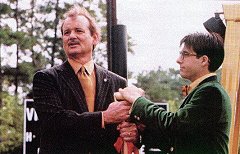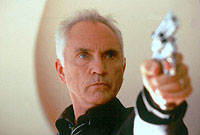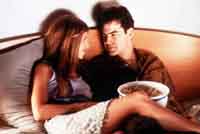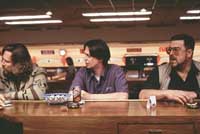
|
Top 50 Underappreciated Recent Films10) Rushmore
--Max Fischer is a hard character to love. He's self-important, bombastic, and a liar. Love doesn't soften him any. After falling in love, he becomes vindictive and more obnoxious. It's a credit to Wes Anderson that despite the fact that his protagonist is a jerk through most of the movie, you still want to root for Max. And his humanization at the end is believable and touching, which makes all his previous conduct forgivable. Rushmore is quirky and idiosyncratic, much like Anderson's next work, The Royal Tenenbaums. Both touching and hysterical, with one of the best soundtracks around and a high school production of a Max Fisher original play that would make Francis Ford Coppola proud, the film is one of the most enjoyable of the '90s. Much of the enjoyment of Rushmore is due in no small part to Bill Murray. Max recruits Murray's character, Herman Blume, a steel magnate and the father of two of Rushmore Academy's students, to help him woo the object of his affection, a first-grade teacher at the Academy. Instead of helping Max, Blume also falls in love with her. Max and Blume then engage in a competition for her affections that is equal turns funny and mean-spirited. Watching the two actors spar verbally and physically is well worth the rental price. Murray was seriously robbed when the Academy overlooked his performance. Rushmore has been compared, both positively and negatively, to The Graduate. Max Fisher could be Benjamin Braddock's younger brother, but where Benjamin suffers from ennui, Max suffers from hyperactivity. However, they both are a bit lost, looking for approval, searching for love, and ultimately, finding happiness (or at least the audience is left with a feeling that both will be happy) by finally accepting the reality of their lives. Rushmore never achieved the financial and critical accolades of The Graduate, but it did help solidify Anderson's place as one of the more innovative directors in Hollywood today. For that, all movie viewers should be thankful. (Stephanie DeGateo/BOP) --After gaining some recognition for their debut film, Bottle Rocket, director Wes Anderson and co-writer Owen Wilson's Rushmore was a breakthrough of sorts. Featuring recognizable actors (Bill Murray) and an accomplished sense of style and tone, it brought their filmmaking style to a slightly more mainstream public. What it did not do, however, was break box office records. But that simple fact does not diminish the accomplishment Anderson achieved with Rushmore. Starring Jason Schwartzman as Max Fischer, the best bad student at Rushmore, a prep school based on Anderson's youth, Rushmore centers on the relationship between Max Fischer and Bill Murray's Herman Blume. They compete for the same woman, a teacher at Rushmore, and the ensuing battle takes up much of the film. While it's never that simple in a Wes Anderson film, in Rushmore, the genesis of much of the action is either related to, or spun off from, the odd love triangle. It's an engrossing mix of atmosphere and stellar performances, particularly that of Bill Murray, who finally finds a director to harness and manage the more serious side of his acting and combine it appropriately with his abundant comedic skills. The revelation of the film is easily Murray, but it bears noting that the accomplished performance from Jason Schwartzman is his first (though he is a member of the Coppola family). (Les Winan/BOP) 9) The Limey
--Schizopolis fans might tell you otherwise, but Steven Soderbergh first hit his stride with the movie Out of Sight. Out of Sight might top this list, save for the fact that it made close to $38 million at the box office and has made another $44 million through rental outlets. Sandwiched between Out of Sight and Erin Brokovich on Soderbergh's resume is 1999's The Limey. Topping out at just over $3 million in domestic box office, with under $12 million in rental receipts, The Limey is a truly underappreciated film that is every bit as good as Out of Sight, Erin Brokovich, Traffic, and Ocean's Eleven. Well-paced at 89 minutes, and featuring an electric performance from Terence Stamp, The Limey is filmmaking and storytelling at its absolute finest; you know, everything you've come to expect from the other Steven. (Calvin Trager/BOP) --Steven Soderbergh's follow-up to the brilliant Out of Sight was another noirish turn, The Limey. Terence Stamp plays Wilson, a British ex-con on his way to LA to avenge the murder of his daughter, Jenny. It matters little to Wilson that his daughter may not have been murdered (she was killed in a car crash that Wilson's convinced was staged) or that he hardly knew Jenny, having spent most of her life in jail. He's a man on a mission. The target of Wilson's mission is Terry Valentine (Peter Fonda), a rock-concert promoter who hit it big in the '60s. Valentine lives in one of those LA homes, with lots of glass, a view of the city and a pool that suspends off a cliff, seemingly ready to fall into the ravine below. He has a too-young girlfriend and a fast car, and you know, just like Wilson, that he had something to do with Jenny's demise. The movie's plot, which is somewhat inconsequential to the movie's brilliance, involves the two scheming against each other through surrogates. What is brilliant about The Limey is its sense of style. First, visually, it is stunning. The camera work, the editing, the set design all invoke Los Angeles in its gleaming, Hollywood best and its seedy, inner-city worst. Even more brilliant is its cast, and, more specifically, the casting of Stamp and Fonda in their respective roles. Both Wilson and Valentine are men who came of age in the late '60s and had their lives affected by rock-and-roll (Wilson was nabbed stealing concert revenues at a Pink Floyd concert; Valentine could be a stand-in for Bill Graham, had the latter lived in LA rather than San Francisco). Both Stamp and Fonda made their names in the '60s and each actor was the personification of British and American culture of the time. Soderbergh uses footage from the 1967 Ken Loach film Poor Cow, in which Stamp played a thief named Wilson, in a flashback, and uses the song Magic Carpet Ride as the soundtrack to a scene where Fonda is driving. It could be argued that the central death in the film isn't Jenny's, but rather the '60s zeitgeist that Valentine promoted and continues to exploit. He's no longer living the peace-and-love lifestyle; that's long been replaced by money and power. But he evokes the late '60s California culture, and uses it to his own advantage. The Limey is a small work in terms of scope and length. However, in terms of its mood, it's one of Soderbergh's best. He manages to, like Valentine, bottle up a certain period of time and stand it on its head and destroy its myth. Without a George Clooney or Julia Roberts to pull in the audience, The Limey suffered at the box office. Despite its lack of star power, the film has some amazing star turns and belongs on a must-see rental list. (Stephanie DeGateo/BOP) 8) Office Space
--There is no film that shows the absurdity of today's work environment better than Office Space. More than just the live-action movie from the guy who did Beavis and Butthead and King of the Hill, it's also a damn funny movie. Mike Judge does a fine job of mocking our PC-based culture while giving us characters and situations we run into every day at work. Who hasn't tussled with the department printer? Or had to deal with a PC-obsessed boss like Bill Lumbergh? Or changed lanes in traffic only to find your new lane is even slower? When Peter Gibbons (Ron Livingston) decides to ignore the rules of the office environment after a brush with death and hypnosis, the movie gives us moments of sheer bliss, like Peter walking right past his boss in the hallway as Lumbergh is posing a question. Or Peter and two co-workers violently exacting their revenge on an evil printer. What makes Office Space so enjoyable is that it shows us a world so familiar that it's almost spooky, yet keeps that world fresh enough that it's still just as funny on the fourth or fifth viewing. If you haven't seen it yet, please do. If you already have, see it again. In fact, I sent you a reminder. Yeah, did ya get that memo? See, we're all watching Office Space again. I'll go ahead and fax you another copy. (David Parker/BOP) --Office Space has, in a few short years, become one of the top "college movies" of all time. What I mean is that in college, more than any other time in one's life, there seem to be an inordinate number of situations where you have a bunch of friends together who want to watch a movie but can't decide on a title. Some movies are too violent; others too long; others get old too quickly, but Office Space? Everyone has always already seen it, and everyone is always willing to watch it again. You know how they have those beer commercials where a bunch of friends come together over a beer? Office Space is like that; everyone's always in the mood to watch it. I think the primary reason for this is the amount of quotability this movie has. There are so many lines in this movie that just crack you up every time you hear them (My favorite: "I believe you have my stapler."). It would seem impossible that a movie will be funny to everyone who sees it, but Office Space seems to have seriously defied those odds. (Zach Kolkin/BOP) 7) Election
--Reese Witherspoon, meet America. America, meet Reese. You two are going to be spending a lot of time together over the next 15 years. Love her or fear her, this is where the next Most Powerful Woman in Hollywood earned her stripes as a lead actress. Earning about $15 million at the box office and about double that through rental outlets, the movie did okay for a smallish wide release, but deserved much more. Darker comedies often fail to find their niche. (Calvin Trager/BOP) --Completing the Matthew Broderick High School Trilogy (following War Games and Ferris Bueller's Day Off, of course) is Alexander Payne's wonderful satire of high-school politics. Reese Witherspoon is perfect as the ultimate overachiever. Chris Klein has since made a career out of playing the same character. Marketed pretty badly and not exactly targeting one certain demographic, too many people missed out on this one in theaters. It hasn't exactly burned up the rental charts, either, and certainly deserves a better fate. (Tim Briody/BOP) --Perhaps the best film ever set in a high school, Election is the brutally funny story of the girl you hated in high school (unless, of course, you were that girl). Tracy Flick, played brilliantly by Reese Witherspoon, is the hyper-involved wunderstudent at George Washington Carver High School. She's everywhere, running every club, with her hand in every high-school activity. When Student Council President election time arrives, she naturally assumes she'll win the election. So, it seems, does everyone else at the school; no one plans to run against her. Enter teacher Jim McAllister (Matthew Broderick, perfectly cast). Mr. M, as he is called, can't stand Tracy. And so he recruits dim-but-popular jock Paul Metzler (Chris Klein) to run against Tracy. Of course, she doesn't take this well, and her true colors become more apparent as the election becomes contested. The beauty of Election is the dynamics between Tracy and Mr. McAllister. He's one of the best teachers at the school, and he should love a student like Tracy. She's bright, involved, supposedly with the best interests of the school in mind...and yet Mr. McAllister wants to hurt her. There's a variety of reasons why, not the least of which is an underlying attraction to her. It's this relationship that elevates Election above the simple "high school as a microcosm for the adult world" teenage flicks like The Breakfast Club and She's All That. Ultimately, Tracey is not the perfect Carver student but really more self-interested and manipulative, and Mr. McAllister is not necessarily the dedicated teacher he presents himself to be. The script, based upon the book by Tom Perotta and written by Payne and Jim Taylor, is funny and touching and sad, all at the same time. In every sense of the word, Election is a winner. (Stephanie DeGateo/BOP) 6) The Big Lebowski
Throw into this plot pornographers, an erotic artist, a bowler named Jesus who’s a registered sex offender (he pronounces his name like the Son of God, not as many Latinos pronounce the name), and Walter, the Dude's best friend who is obsessed with Vietnam. The Big Lebowski is set at the time of the Gulf War, and Walter (John Goodman) speaks in sound bites taken directly from George Bush's press conferences about the war. The movie can, at times, devolve into chaos. However, it is also visually stunning. At one point, The Dude hallucinates a Busby Berkeley-inspired scene set in a bowling alley. Bridges embodies the role of The Dude, bringing a certain humanistic side to a character that has nothing to offer to anyone but himself. While The Big Lebowski suffered in comparison to the previous Coen Brothers' film, Fargo, it has its own flashes of brilliance. Similar in scope and mood to Raising Arizona, The Big Lebowski is a funny, fun to watch film. (Stephanie DeGateo/BOP) --The Big Lebowski is a fun film. It's a laugh-out-loud stoner comedy with a bit of twist. It's not the sort of film that's going to win that many awards, it's not going to be studied in university courses in 20 years time. I mean, we're not really talking intellectual stuff here. Which is why I think it's under appreciated. Throw something like Dude, Where's My Car? into the mix and audiences lap it up, but commercial success eluded The Big Lebowski, which relies on some pretty similar jokes and situations (basically stoned guy without a clue what's going on) but is a lot funnier. Maybe it's the age of the cast. Jeff Bridges, John Goodman and Steve Buscemi are fine actors, but none of them are really teen pin-up material. But I suspect more than anything it is guilt by association, or maybe a form of self-fulfilling prophecy. No one expects Coen Brothers' films to have broad appeal, so it doesn't matter how funny The Big Lebowski is; it's just not going to be marketed towards any sort of audience beyond those of us who see everything they make. (Ash Wakeman/BOP) --If you give the best performance of the year, and of your career, and nobody notices, did it actually happen? Jeff Bridges' Jeffrey "The Dude" Lebowski is one of the more impressively realized acting creations in recent years, and while his performance certainly was acknowledged by critics, it was relatively ignored in general. The Big Lebowski, a Coen Brothers film in every sense of the concept, revolves around a case of mistaken identity, but that doesn't matter so much as the environment created around the plot and the absolute richness of all of the characters present. Standout supporting performances from John Goodman, Steve Buscemi, Julianne Moore, Philip Seymour Hoffman, John Turturro, David Huddleston, Peter Stormare and Tara Reid propel the film along, dragging the perpetually white Russian-drinking Dude through his attempts to get a new rug. Deciding which of a host of complimentary adjectives to describe the movie with is a bit like being a kid in a candy store...The Big Lebowski is a rich, whimsical, intelligent, brilliant comedy. That the acting in this film and the writing and directing of the Coen Brothers was not better recognized is a crime. Bridges and Goodman, in particular, give some of the more absorbingly detailed performances in recent memory; to miss recognizing the masterpiece that is The Big Lebowski is a grand mistake for any film fan. (Les Winan/BOP)
Click here to read selections 50-46.
|
Saturday, April 26, 2025
© 2006 Box Office Prophets, a division of One Of Us, Inc.
 --Wes Anderson continues to prove his abilities. Bill Murray is funny again.
There are go-karts and remote-control planes. (Matthew Kinney/BOP)
--Wes Anderson continues to prove his abilities. Bill Murray is funny again.
There are go-karts and remote-control planes. (Matthew Kinney/BOP)
 --Slick and sticky LA is captured to perfection in a noirish caper film that
pulls great performances from all of its actors and captures the strange
irony that is the shiny-clean, nasty-dirty underbelly of the City of Angels.
(Matthew Kinney/BOP)
--Slick and sticky LA is captured to perfection in a noirish caper film that
pulls great performances from all of its actors and captures the strange
irony that is the shiny-clean, nasty-dirty underbelly of the City of Angels.
(Matthew Kinney/BOP)
 --Obtain a copy of Geto Boys' "Damn It Feels Good to Be a Gangsta". Disassemble
your cube. Make fun of everyone you know named Bob. Kick someone named Bill
in the shin. Buy someone named Milton a red Swingline. (Matthew Kinney/BOP)
--Obtain a copy of Geto Boys' "Damn It Feels Good to Be a Gangsta". Disassemble
your cube. Make fun of everyone you know named Bob. Kick someone named Bill
in the shin. Buy someone named Milton a red Swingline. (Matthew Kinney/BOP)
 --It's the anti-Ferris movie. It's an amazing fall of a man that ultimately
brings him to a happier place. It's the overachieving freak I almost became.
It's the content, self-aware adult I hope to become. It's a great film to
watch on a lazy Saturday afternoon. (Matthew Kinney/BOP)
--It's the anti-Ferris movie. It's an amazing fall of a man that ultimately
brings him to a happier place. It's the overachieving freak I almost became.
It's the content, self-aware adult I hope to become. It's a great film to
watch on a lazy Saturday afternoon. (Matthew Kinney/BOP)
 --The plot to The Big Lebowski is convoluted, and beside the point, really. The Dude, whose real name is Jeff Lebowski, is a pot-smoking, white Russian-guzzling slacker who loves to bowl. Smoke pot, drink white Russians and bowl...that's pretty much it. As played by Jeff Bridges, the Dude is definitely of a type. He's got long hair, a paunch, big tropical shirts and no real sense of style or regard for himself. The Dude is visited one day by two thugs looking to get money from Jeff Lebowski. Well, they've got the wrong Lebowski; the other Jeff Lebowski lives in a mansion with his trophy wife and servants. Before the thugs leave, they urinate on The Dude's carpet, which royally pisses him off. Seeking restitution, The Dude visits the Big Lebowski, and though he doesn't get the money to clean his rug, he gets pulled into a scheme to rescue the Big Lebowski's wife Bunny.
--The plot to The Big Lebowski is convoluted, and beside the point, really. The Dude, whose real name is Jeff Lebowski, is a pot-smoking, white Russian-guzzling slacker who loves to bowl. Smoke pot, drink white Russians and bowl...that's pretty much it. As played by Jeff Bridges, the Dude is definitely of a type. He's got long hair, a paunch, big tropical shirts and no real sense of style or regard for himself. The Dude is visited one day by two thugs looking to get money from Jeff Lebowski. Well, they've got the wrong Lebowski; the other Jeff Lebowski lives in a mansion with his trophy wife and servants. Before the thugs leave, they urinate on The Dude's carpet, which royally pisses him off. Seeking restitution, The Dude visits the Big Lebowski, and though he doesn't get the money to clean his rug, he gets pulled into a scheme to rescue the Big Lebowski's wife Bunny.